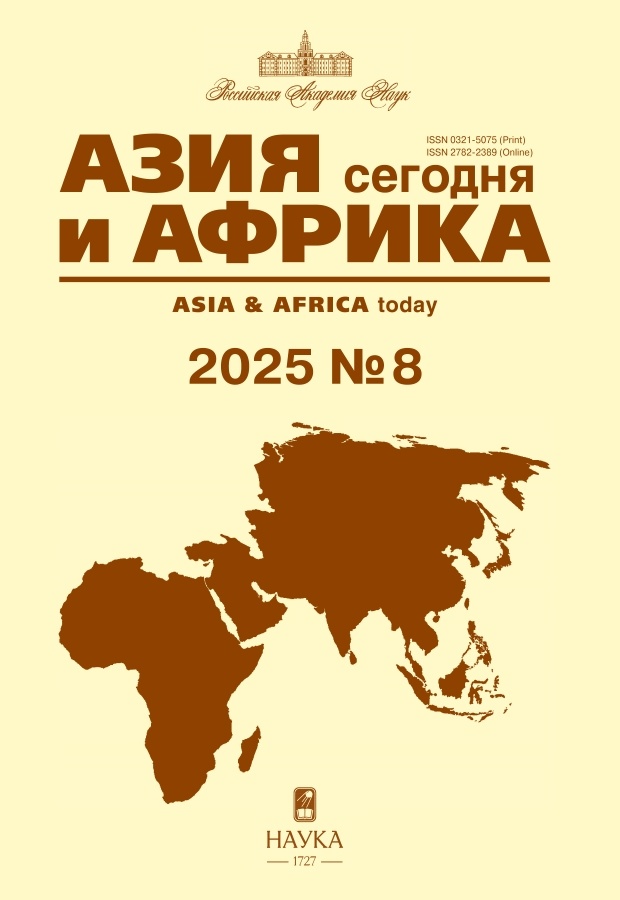Participation of Bandung Countries in the Formation of the Big Eurasian Partnership (to the 70th Anniversary of the Bandung Conference)
- Autores: Andreeva E.L1, Ratner A.V1, Zakharova V.V1
-
Afiliações:
- Institute of Economics, Ural Branch, Russian Academy of Sciences
- Edição: Nº 8 (2025)
- Páginas: 5-13
- Seção: Top problem
- URL: https://cardiosomatics.ru/0321-5075/article/view/690661
- DOI: https://doi.org/10.31857/S0321507525080019
- ID: 690661
Citar
Texto integral
Resumo
The year 2025 marks the 70th anniversary of the Bandung Conference, where 29 Asian and African countries articulated shared goals for trade and economic cooperation in their final communique. The creation of the Big Eurasian Partnership (BEP), initiated by Russia, aims to involve friendly Asian and African nations, including Bandung countries, in this initiative. This study substantiates the alignment of interests between Russia and developing Asian and African countries within the framework of economic principles established at Bandung. Content analysis of the Conference’s economic communique and relevant economic agreements with Russia and the Eurasian Economic Union (EAEU) reveals convergence between the communique’s principles and the institutional foundations of the BEP. The economic development trajectories of the participating countries are analyzed. Cooperation spheres, types of agreements, and instruments are classified according to each of the Conference’s ten core economic tasks. Furthermore, the positioning of the BEP as an integration framework aligned with the Conference’s principles and purposes is substantiated. The partnership’s “soft” format allows countries to choose cooperation spheres and instruments best suited to their needs, facilitating economic integration based on shared interests. Analysis of the institutional cooperation framework substantiates distinct tiers of engagement between Russia and Conference participants, alongside the instruments necessary for BEP development.
Sobre autores
E. Andreeva
Institute of Economics, Ural Branch, Russian Academy of Sciences
Email: andreeva.el@uiec.ru
Dr.Sc. (Economics), Professor, Head, Centre of Regional Comparative Studies Yekaterinburg, Russia
A. Ratner
Institute of Economics, Ural Branch, Russian Academy of Sciences
Email: ratner.av@uiec.ru
PhD (Economics), Senior Re- searcher, Centre of Regional Comparative Studies Yekaterinburg, Russia
V. Zakharova
Institute of Economics, Ural Branch, Russian Academy of Sciences
Email: zakharova.vv@uiec.ru
Junior Researcher, Centre of Regional Comparative Studies Yekaterinburg, Russia
Bibliografia
- Efimova L.M., Khokhlova N.I. 2020. Conceptualisation of “Asian values” in Malaysia and Singapore. World Economy and International Relations. № 1. Pp. 91–98. (In Russ.). doi: 10.20542/0131-2227-2020-64-1-91-98
- Boyarkina A.V. 2008. Chinese authors about building a harmonious and sustainable world. Russia and the Pacific.№ 4. Pp. 170–179. (In Russ.)
- Portelli J., Campbell-Stephens R. 2009. Leading for equity: The investing in diversity approach. Toronto: Edphil Books. 74 p.
- Andreeva E.L., Ratner A.V. 2024. Assessing the Resource Provision: from the EAEU to the Greater Eurasian Space. Economy of Regions. № 1. Yekaterinburg. Pp. 263–275. (In Russ.). doi: 10.17059/ekon.reg.2024-1-18
- Karaganov S.A. 2022. From non-West to global majority. Russia in Global Affairs. № 5. Moscow. Pp. 6–18. (In Russ.). https://globalaffairs.ru/articles/ot-ne-zapada-k-bolshinstvu (accessed: 11.09.2024)
- Clifford A. Kiracofe. 2023. Pushing Back Against Propaganda. Beijing Review. № 33. Beijing. Pp. 28–29. DOI: CNKI:SUN:BJZB.0.2023-33-013
- Stewart P. et al. 2024. Reimagining Global Economic Governance: African and Global Perspectives. Report. Washington: Carnegie Endowment for International Peace. 1 Sept. 20 p. http://www.jstor.org/stable/resrep63080.10 (accessed 15.02.2025)
- Kapitsa L.M. 2018. South: The Road to Economic Independence. Economics: Yesterday, Today and Tomorrow. № 10А. Noginsk. Pp. 442–465. (In Russ.)
- Bogdanov K.V., Kobrinskaya I.Ya., Frumkin B.E. 2024. Race on the Global South, or Fight for Global Majority. Russia in Global Affairs. № 5. Moscow. Pp. 80–97. (In Russ.). doi: 10.31278/1810-6439-2024-22-5-80-97
- Mazyrin V.M. 2024. The EAEU – Vietnam Free Trade Agreement: Expectations and Reality. Outlines of Global Transformations: Politics, Economics, Law. № 3. Moscow. Pp. 128–148. (In Russ.). doi: 10.31249/kgt/2024.03.07
- Smirnov A.V., Kasavina N.A., Nikolsky S.A. (Eds.). 2023. Civilization: Polyphony of Meanings. Memoria. (Series “Humanitas”). Moscow, St Petersburg. 540 p. (In Russ.)
- Boytsov V.V. 2015. The spirit of Bandung and the Practice of Economic Cooperation in South-East Asia. Southeast Asia: Actual Problems of Development. № 26. Moscow. Pp. 18–25. (In Russ.)
- Drugov A.Yu. 2009. Russia – Indonesia: “inflows” and “outflows”. Asia and Africa today. № 12. Moscow. Pp. 5–12. (In Russ.)
- Safronova E.I. 2017. China and Developing Countries: History and Conceptual Basis of Relations (1949–2013) (the case of Africa and Latin America). Moscow, 130 p. (In Russ.)
- Ahmed Salem Al-Wahishi, Baklanov A.G. 2021. Ideas of Afro-Asian solidarity and the realities of the XXI century. Asia and Africa today. № 3. Moscow. Pp. 78–80. (In Russ.)
- Simoniya A.A. 2015. From Bandung conference to ASEAN chairmanship: Myanmar’s long way to restoration of active foreign policy. Southeast Asia: Actual Problems of Development. № 26. Moscow. С. 93–113. (In Russ.)
- Nuzhdin I.I., Dmitriev R.V. 2024. Regional Disproportions in Russian Exports of Agricultural Products to African Countries. Asia and Africa today. № 7. Moscow. Pp. 17–23. (In Russ.). doi: 10.31857/S032150750031388-8
- Velikaya A.A. 2024. Russia’s Humanitarian Policy in Southeast Asia. Pathways to Peace and Security. № 1. Moscow. Pp. 179–193. (In Russ.). doi: 10.20542/2307-1494-2024-1-179-193
Arquivos suplementares










